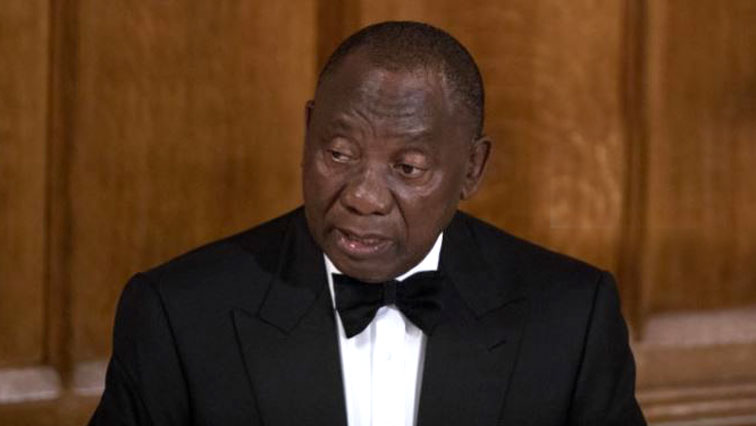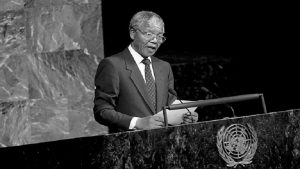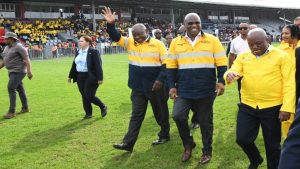After all the noise and arresting the leakages (across all government sectors & SOEs as well as in businesses), a winning game is premised on attracting domestic and foreign investment for economic growth and job creation. This is what South Africa should be aspiring to.
On Monday, April 16, 2018 President Cyril Ramaphosa prior to leading a South African delegation to the Commonwealth Heads of Government Meeting (CHOGM 2018), held in London, launched an ambitious new investment drive aimed at attracting $100b over a 5 year period. A four-member team, “a special envoy”, consists of credible, heavyweight individuals will be travelling the world to build an investment “order book” in preparation for investment summit planned for August/ September this year as part of fulfilling his 2018 State of the Nation Address 2018.
The envoy will be supported by a highly capable, Ms Trudi Makhaya who was announced as his economic adviser. Among her immediate responsibilities will be the coordination of the work of these Special Envoys and a series of investment roadshows in preparation for the Investment Conference.
No sooner had President Ramaphosa touched down in London, South Africa received the news that President Ramaphosa and British Prime Minister Theresa May agreed on a deal worth £50m (~R860m) new UK funding across the next four years to help South Africa improve its business environment, to make it more attractive to investors including in the UK, and ultimately lift some of the poorest people in South Africa out of poverty by creating jobs and opportunities.
This R860m aims to help identify and dismantle barriers to trade within Africa and beyond, creating a wealth of opportunities for UK business over the coming years, millions to help South Africa improve its business environment. Clearly, the man is in a mission and he knows what he is doing. He is not only “sending people”, he is doing it himself. Everyone is energised which was clearly evident when Jacko Maree, (one of the 4 member team of the special envoy), decided to drop everything and joined Ramaphosa on the trip to London – at a very short notice.
$100 billion is a Big Hairy Audacious Goal (BHAG) though President Ramaphosa insists that this is a minimum and we should strive to over achieve. In today exchange, President is asking for R1,198,305,543,110 or R239,661,108,622 per year for 5 years in new (foreign) investment. These numbers have not been seen, certainly not in recent times. There are a number of reasons why Foreign Direct Investment (FDI) has seen a slow growth in South Africa – and other parts of the world, of course. Internally, South Africa has been affected by a dramatic slowdown in key goods-producing sectors, mainly in the mining and manufacturing sectors. Like many countries, after the global recession of 2008/9, many of our economic sectors experienced a sharply reduced domestic and export demand levels. Technological innovation has also seen labour intensive sectors suffering the worse while services have seen formidable growth.
Our economic performance largely depended on commodity prices, thus the fall of commodity prices, what others have called “the end of the commodity super-cycle”, exposed our lack of or limitation of diversification in our economy. Our problems were compounded by other scourges of corruption, state capture and poor policy-making.
The two greatest derivers for growth are fixed investment spending and export-led spending. It is common cause that neither made much more than a cameo appearance in the Zuma’ years. The consequences of Zuma’s irrational presidential era are largely to blame for our regression. His tenure can best be described as in the following manner: lack of investor confidence and lack of actual, productive investment into our economy; growing political uncertainty, unwillingness by lenders in capital markets to finance the ever-increasing debt by state-owned enterprises through bond purchases or even new loans and ‘culture of no-consequence’ for the blatant abuses of public resources.
At one stage, National Treasury made a damning confession: “Policy and political uncertainty remain central risks to the domestic economic outlook. Elevated policy and political uncertainty, coupled with weak confidence, discourage investment and consumption,” they blatantly confessed. The cancers of corruption and state capture remain undefeated, thus still present a miasma.
The South African economy desperately needs Foreign Direct Investment (FDI) that is grounded on building bricks and mortals. Unlike Foreign Portfolio Investment (FPI), “hot money”, FDI is a cornerstone of meaningful, economic growth. We are already well placed for FPI as we pride ourselves with sophisticated capital and bond market, world class stock exchange, renowned derivatives market. While FDI flows tend to be volatile (as data from UNCTAD and SARB can confirm), the uncomfortable truth (reality) is that FPI is more “unstable” as it can leave as hastily as it comes. Thus, it is “insufficient” to only rely on FPI. Our economy needs to create jobs and transform at the same time.
However, few fundamentals need to be in place to attract the much-needed FDI, and no doubt, the special envoy should be prepared to provide credible response to the questions. Chief amongst many questions would be to demonstrate the following:
- Does South Africa has a strong rule of law?
- Do we have a predictable, certain and enabling regulatory environment? [Legislation that promotes both domestic and foreign investment.]
- Does the South African environment provide a progressive tax system that supports inclusive growth objectives?
- Is our economy transformed or transforming and inclusive enough to create sustainable employment?
- How about our capacity and capabilities to meet the requirements of potential investors?
- Does the country’s infrastructure support growth?
- Is the energy policy in place to target economic growth with secure base-load electricity at a comparative possible price?
- Are there plans in place to restructure country’s state assets, which are performing badly and or non-core?
President Ramaphosa correctly bemoans the fact that our investment rate falls short of creating an inclusive economic growth that is required to create jobs. This economy will forever remain in a state of paralysis if our investment rate hobbles around 17% – 18%. The self-inflicted damage has ensured that we regressed from 24% – 25% investment rate last seen in 2008 to current levels of 18% (of our GDP). With this BHAG – and local investment, our economy requires 30% investment rate.
In the world of investment, it is important to provide “Reasons to Believe” (RTB), and President Ramaphosa stated that the team will be communicating a clear and consistent message – that South Africa is an investment destination with significant unrealised potential.
Amongst the RTB, he cited the following as the strength of our offering:
- A thriving democracy, an independent judiciary and strong institutions.
- An advanced and diverse economy, a sophisticated and well-regulated financial sector,
- Extensive transport, telecommunications and energy infrastructure.
- A youthful (multi-talented, multi-ethnic indigenous) population, an improving basic education system and significantly expanded higher education enrolment.
He conceded that investors might require ever more RTB’s, thus the team should be prepared to brief investors on the measures we are undertaking to improve the investment environment.
We should embrace the efforts of the current administration as, within the space of 3 months, we have seen positive movements in the following:
- Progress in bringing to books the architecture of state capture,
- Credible attempts to stabilise strategic state owned enterprises,
- Improving the functioning of key institutions like SARS,
- Cooperation to finalise a new Mining Charter through consultation with all stakeholders,
- Processing legislation for the implementation of the National Minimum Wage and the promotion of labour stability,
- Signing of IPP by Minister of Energy, and
- Launch the Youth Employment Service to increase the employability of first-time job seekers.
A lot still needs to be done but progress is underway. Investor confidence tends to respond positively to demonstrably signals of progress. We need quick, big wins. This would feed to the growth in business confidence, which we have seen over the last few months, confirmed by the strengthening of our domestic currency, improvement in investor outlook and improved growth estimates.
With a little bit of careful planning and hard work, the BHAG is attainable. Extra work by the team might even produce FDI that is outward-looking thus giving our economy export- earning, foreign revenue, reducing our foreign exchange deficit. These would be an upside to job creation, improvement in personal income tax, corporate taxes, creation of new industries and consumers as well as reduction of the deficit gap.
Let’s unleash our pack of lions while our local companies are also coming to the party as well.
About the author: Sizwe Mbele, Director of Strategy: Business Leadership South Africa.







